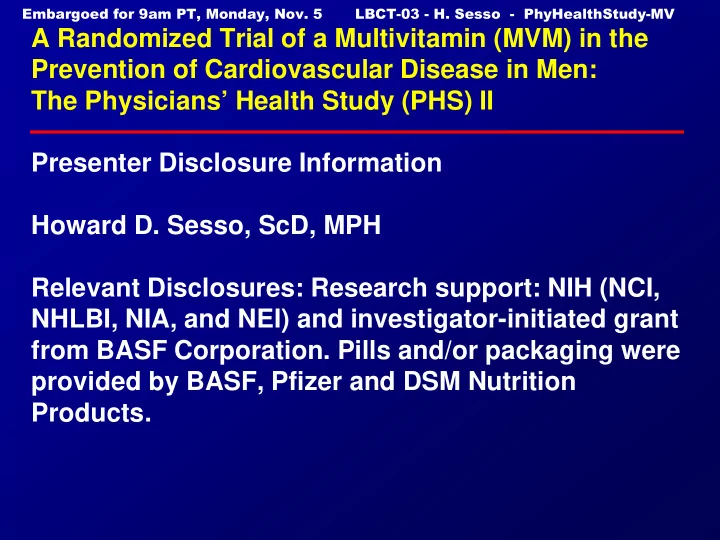

Embargoed for 9am PT, Monday, Nov. 5 LBCT-03 - H. Sesso - PhyHealthStudy-MV A Randomized Trial of a Multivitamin (MVM) in the Prevention of Cardiovascular Disease in Men: The Physicians’ Health Study (PHS) II Presenter Disclosure Information Howard D. Sesso, ScD, MPH Relevant Disclosures: Research support: NIH (NCI, NHLBI, NIA, and NEI) and investigator-initiated grant from BASF Corporation. Pills and/or packaging were provided by BASF, Pfizer and DSM Nutrition Products.
A Randomized Trial of a Multivitamin in the Prevention of Cardiovascular Disease in Men: The Physicians’ Health Study II Sesso, Christen, Bubes, Smith, MacFadyen, Schvartz, Manson, Glynn, Buring, and Gaziano Funding: NIH (NCI, NHLBI, NIA, and NEI) and an investigator-initiated grant from BASF Corporation. Pills and/or packaging were provided by BASF, Pfizer and DSM Nutrition Products.
Background • More than half of US adults take vitamin supplements and common multivitamins (MVM) are the most widely used. • Basic research suggests how some components of MVM might reduce the risk of cardiovascular disease (CVD). Observational studies have not clearly demonstrated associations of MVM with lower risk of CVD. • There are no large-scale, long-term randomized trials of MVM in the prevention of chronic diseases.
Physicians’ Health Study (PHS) 1982 – 1996: PHS I enrolled 22,071 male physicians in a trial by mail of aspirin and beta-carotene in the prevention of CVD and cancer. 1997 – present: PHS II enrolled 7,641 PHS I participants and 7,000 new physicians in a new trial.
Physicians’ Health Study II: Design • Randomized, double-blind, placebo- controlled, factorial design trial conducted by mail among 14,641 male physicians aged 50 and older. • Evaluated the long-term risks and benefits of vitamin E (400 IU every other day) vitamin C (500 mg daily) multivitamin (daily) • Primary outcomes: CVD and cancer • Secondary outcomes: Eye disease and cognitive function
PHYSICIANS’ HEALTH STUDY II RANDOMIZATION SCHEME Phase II: Mailed invitations Phase I: Mailed Invitations to to 254,597 MDs 18,763 PHS I participants 11,128 7,641 7,000 Enrolled in a Run-in Randomized 14,641 Active Vitamin E Vitamin E Placebo Active Vitamin C Vitamin C Placebo Vitamin C Placebo Active Vitamin C Active Multi- Active Multi- Active Multi- Active Multi- Multi- Vitamin Multi- Vitamin Multi- Vitamin Multi- Vitamin Vitamin Placebo Vitamin Placebo Vitamin Placebo Vitamin Placebo
Monthly Calendar Pack
PHS II: Follow-up Mean follow-up was 11.2 years, for a total of more than 164,000 person-years of follow-up. MVM compliance: 77% at 4 years, 72% at 8 years, and 67% at study end. Primary CVD Outcome: Major cardiovascular events (nonfatal myocardial infarction (MI), nonfatal stroke, and CVD death) Other CVD Outcomes: Total MI, total stroke, ischemic and hemorrhagic stroke, CVD mortality, and total mortality.
PHS II: Baseline Characteristics MVM assignment Active Placebo (n = 7317) (n = 7324) Age, mean (SD) 64.2 (9.1) 64.3 (9.2) BMI, mean (SD) 25.9 (3.4) 26.0 (3.4) Current smoker, % 3.5 3.7 Exercise >1 time/wk, % 62.2 60.7 Current aspirin use, % 77.5 77.3 Hypertension, % 41.8 42.7 Hypercholesterolemia, % 36.0 37.3 Plasma TC, mean (SD) 203.5 (35.5) 203.7 (36.0) Fruits & vegetables, servings/d 4.26 (2.95-5.75) 4.19 (2.94-5.77) Whole grains, servings/d 1.13 (0.49-2.00) 1.07 (0.49-1.99) JAMA 2012 In press
JAMA 2012 In press
JAMA 2012 In press
Cardiovascular Events by MVM Treatment Assignment HR Active Placebo Outcome P (95% CI) (n = 7324) (n = 7317) Major cardiovascular events 876 856 1.01 (0.91-1.10) .91 317 335 0.93 (0.80-1.09) .39 Total MI 27 43 0.61 (0.38-0.995) .048 MI death Total stroke 332 311 1.06 (0.91-1.23) .48 89 76 1.16 (0.85-1.58) .34 Stroke death 277 250 1.10 (0.92-1.30) .29 Ischemic stroke Hemorrhagic stroke 49 45 1.08 (0.72-1.63) .69 408 421 0.95 (0.83-1.09) .47 Cardiovascular death 1345 1412 0.94 (0.88-1.02) .13 Total mortality JAMA 2012 In press
JAMA 2012 In press
Possible effect modification Table or Figure (no meaningful effect modification noted by baseline risk factors, history of CVD, dietary factors, or other PHS II randomized treatments)
Cancer Events by MVM Treatment Assignment HR Active Placebo Outcome P (95% CI) (n = 7324) (n = 7317) Total cancer 1290 1379 0.92 (0.86-0.998) .04 Total epithelial cell cancer 1158 1244 0.92 (0.85-0.997) .04 Total cancer minus 641 715 0.88 (0.79-0.98) .02 prostate Cancer mortality 403 456 0.88 (0.77-1.01) .07 Total mortality 1345 1412 0.94 (0.88-1.02) .13 By baseline history of cancer Yes (n=1312) 95 126 0.73 (0.56-0.96) .02 No (n=13329) 1195 1253 0.94 (0.87-1.02) .15 JAMA 2012; Online October 17, 2012
Conclusions • PHS II is the only large-scale randomized trial testing long-term MVM use, finding no effect on major cardiovascular events in men. • The main reason to take a daily MVM remains to prevent vitamin and mineral deficiency. • The decision to take a MVM should consider its beneficial effects on cancer and other important outcomes to be studied. • Additional analyses are planned on relevant CVD outcomes with the hope of extending follow-up of the PHS II cohort.
JAMA Slide (front page of article for simultaneous publication)
Recommend
More recommend